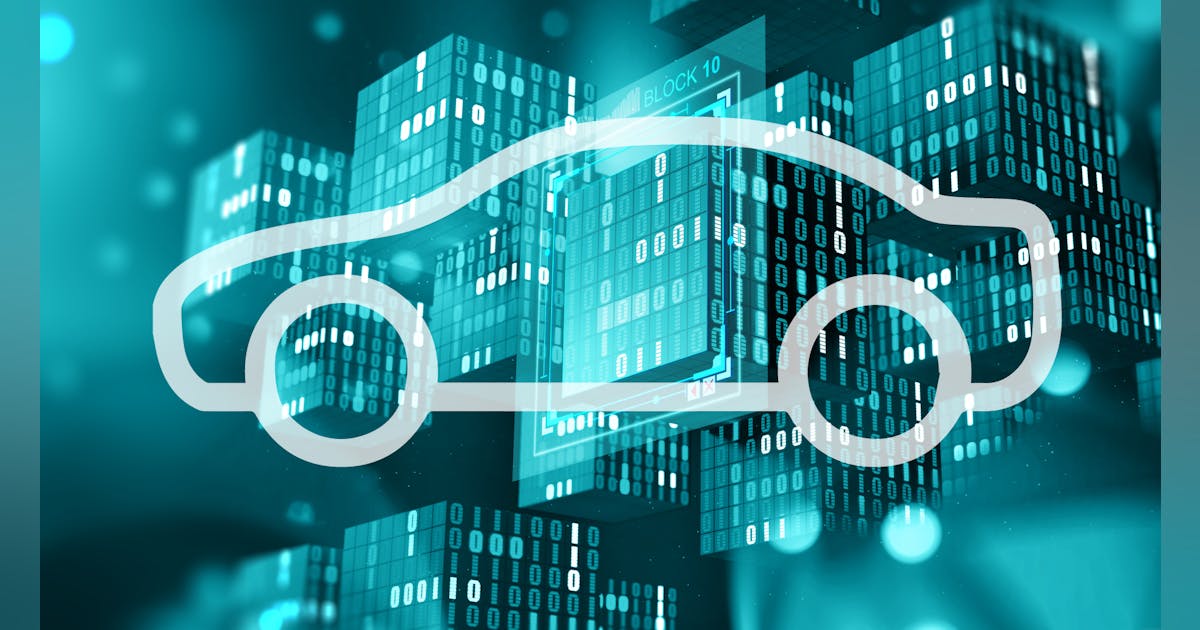[ad_1]
Download this article in PDF format.
A distributed database that’s shared across a computer network’s nodes, blockchains are most prominent in cryptocurrency systems like Bitcoin, but their application is much more wide-ranging. In fact, organizations across most industries are either experimenting with or already using blockchain, and the automotive sector is no exception.
Valued at $350 million in 2020, the global automotive blockchain market is expected to grow to $2.84 billion by 2028 and is currently posting a compound annual growth rate (CAGR) of nearly 34%, according to Fortune Business Insights.
The research firm says the rising penetration of autonomous vehicles is fueling the trend, and that OEMs and automakers are “likely to exhibit traction for better quality control as venture capitalists boost their portfolios.” It points to UNA Blockchain’s automotive industry blockchain ecosystem and electric vehicle (EV) company Daymak’s launch of the crypto mining vehicle “the Daymak Spiritus” as two of the biggest developments in the sector.
Taking Blockchain on the Road
According to Daymak, the Spiritus three-wheel, two-seater electric car rides like a go-kart and comes with a lot of built-in, high-tech features, including solar panels for trickle charging, a regeneration system and a patent-pending wireless charger. The car also mines cryptocurrency using the patent-pending Daymak Nebula platform. Launching in 2023, every Spiritus car will be a node on the blockchain. Users will be able to generate income from both Proof-of-Work and Proof-of-Stake coins.
“Blockchain technology and cryptocurrency are two of the most disruptive innovations of our time, and we are proud to be the first auto-manufacturer in history to incorporate [them] into our Spiritus EV offering,” said Daymak President Aldo Baiocchi in a press release. “While every other car sits depreciating in the garage, Spiritus owners will have a vehicle that has the potential to pay for itself while it’s parked.”
This is just one example of how blockchain is making its way into the automotive industry, where its applications go well beyond cryptocurrencies and data mining. For example, TU-Automotive says blockchain can be used to protect real-time, onboard; help deliver explainable artificial intelligence (AI) systems; and provide trust across complex supply chains. “Global brands like Ford and BMW, for example, have already implemented blockchain within their manufacturing processes,” the publication says.
Breaking Down the Silos
Blockchain can also help break down some of the walls that exist within the automotive supply chain, where keeping intellectual property and trade secrets private are often of utmost concern. To help, a new generation of private blockchain is emerging where a single authority or organization ultimately retains control and no one can enter this type of network without proper authentication.
“Private blockchains offer most, if not all, the distributed benefits of public blockchains,” TU-Automotive points out, “[while the] retention of overall control helps to improve privacy and eliminate many of the illicit activities often associated with public blockchains and crypto-currencies.”
Blockchain distributed ledgers can also provide the trust and confidence required to help ensure that transactions across all stages—from sourcing and purchasing to production and shipping—are transparent and immutable, making the introduction of counterfeit components into the supply chain almost impossible.
“Moreover, blockchain can be used with other technologies like the Internet of Things (IoT) and AI to manage the massive amounts of data produced daily by automotive manufacturers,” the publication adds. “For example, blockchains can encompass vehicle component bills of lading (BOL), harness quality-inspection records from the production process and store Work in Progress (WIP) data for each assembly line from beginning to end.”
Streamlining Procurement
Of particular interest to procurement professionals working in the automotive space, blockchain also provides support for smart contracts—or the business logic that automatically executes, controls and documents legally relevant events and actions.
“For example, they can release sales orders automatically at specific stages of the production process,” TU-Automotive explains, “while contracts might be automatically granted to providers with the most inventory to protect supply chains.”
[ad_2]
Source link






More Stories
Can You Make Money Operating a Garbage Truck?
How to Sell Your Used Semi Truck Online
Will the Electric Car Cause a Power Shift in the Automotive Industry?